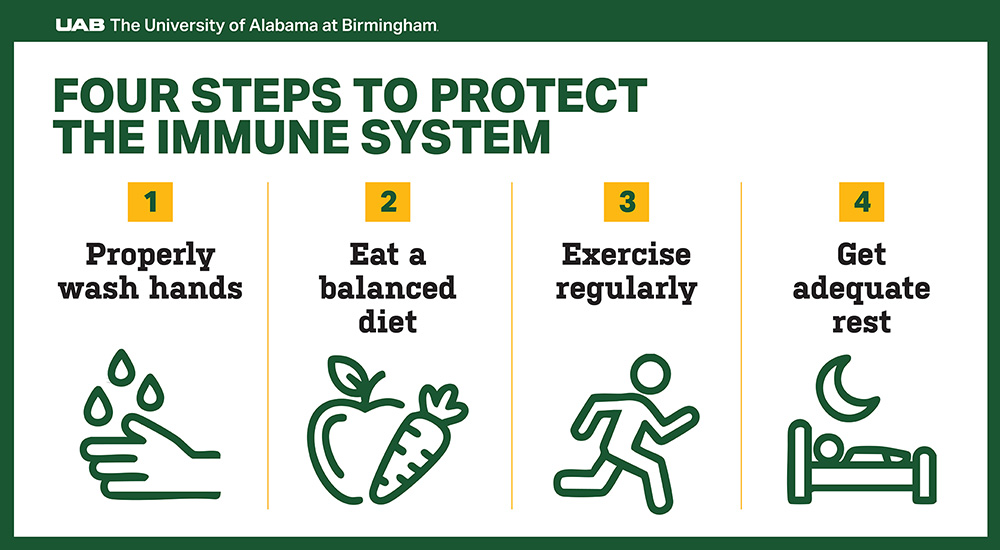
As winter looms on the horizon, so do viruses and bacteria prepared to usher in annual colds and flu. The immune system is the first line of defense against these types of viral infections and illnesses. Two University of Alabama at Birmingham professors offer tips to build and protect the immune system before cold and flu season fully arrives.
What is the immune system?
From birth, the human body begins learning how to protect itself from environmental threats. The immune system is the body’s internal network working to combat foreign pathogens to maintain good health. This consists of cells, internal organs and even the skin of the body itself.
“Think of it as the body’s military,” said Stephen Russell, M.D., professor in UAB’s Division of General Internal Medicine and Population Science. “The immune system helps to distinguish what is normal and can pass versus what may be a threat to our overall health and needs to be kept out of the body.”
The immune system is built through the overcoming of previous illness and the receipt of vaccines. These forms train the immune system to block and defend against future encounters with the pathogen that has already been introduced to the body. However, there are multiple ways to protect the immune system before viruses and bacteria can infiltrate.
Wash hands consistently
Handwashing is one of the most efficient ways to prevent the entrance of bacteria, viruses or allergens into the body.
“Throughout the day, our hands often go to our mouth, eyes and nose,” Russell said. “The more we can keep our hands washed and cleaned, the more we can protect ourselves from things that can be on our hands.”
 Eat a nutritious diet
Eat a nutritious diet
Eating a diet that is full of fresh fruits and vegetables is an important step in protecting the immune system.
Caroline Cohen, Ph.D., R.D., L.D., a clinical dietitian and assistant professor in the University of Alabama at Birmingham Department of Family and Community Medicine, says prioritizing whole foods and a colorful plate is key in maintaining strong immune support.
“The nutrients that exist in whole foods act synergistically,” Cohen said. “Fruits, vegetables and a colorful plate in general can work to strengthen your immune system.”
Cohen says there are certainly specific nutrients that dietitians emphasize to make sure the immune function is optimized.
“Vitamin C is pretty abundant in fruits and vegetables and works as a natural immune support,” Cohen said.
Foods rich in vitamins C and D serve as efficient immune boosters and supporters. These include:
- citrus fruits
- kiwi
- berries
- bell peppers
- fatty fish
- milk
- egg yolks
- mushrooms
A diet that is predominantly made up of processed foods has a significant decrease in the nutrient intake that helps improve the immune system. Shelf-stabilized foods have had many of the immune supportive benefits significantly decreased. This loss in nutritional attributes makes whole foods greater sources of immune system support.
“Generally speaking, a colorful plate is a great framework to have,” Cohen said.
Exercise regularly
Maintaining an active lifestyle is an important element in the effective regulation of the immune system. Russell says getting an age-appropriate amount of exercise can help provide additional support for your body’s immune system. “For most adults, this translates to about 30 minutes of aerobic exercise for five days a week,” he said.
Get enough sleep
Adequate rest is an essential piece of the body’s ability to defend against infection. During sleep cycles, the body works to replenish and repair itself. This can take the form of healing from any exposures during the day and improving the immune system itself.
Are supplements sufficient?
While social media and modern trends encourage and promote many different forms of immune support in the form of supplements, doctors say there is no pill that can completely replace the benefits of a strategic, well-balanced diet.
“Unfortunately, we do not have much strong scientific data that supports that supplements are going to be more beneficial than a well-rounded and healthy diet,” Russell said. “While supplements are beneficial for individuals depending on their lifestyle or diagnosed deficiencies, nutrients through whole foods are always going to be the preferred approach and suggestion for initial immune support.”